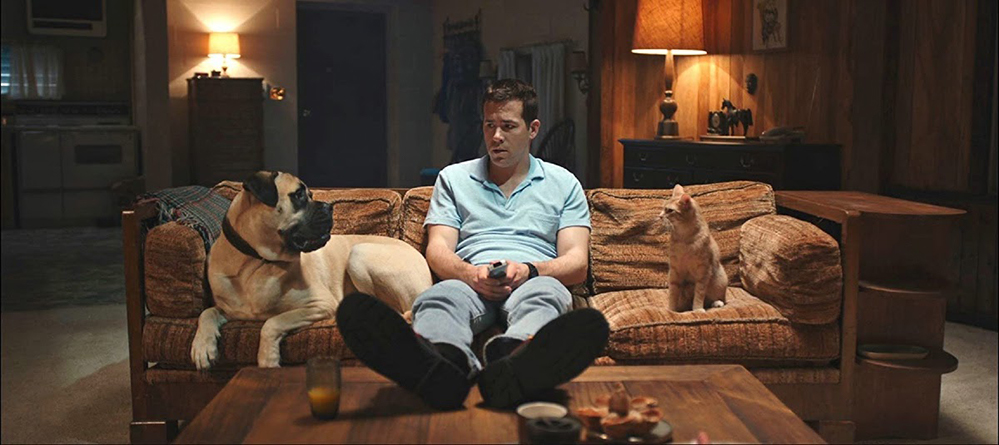One of the most recurring archetypes in film is the “Nice Guy”. He’s handsome, but not to the point where he stops being relatable. His brand of charm is tailored so men can easily project themselves on him rather than being a larger than life fantasy. In some instances, these cinematic Nice Guys have toxic traits that their films portray as “endearing”, which has partially led to the normalization of behaviors like stalking or self-entitlement over women’s lives.
In The Voices, director Marjane Satrapi and writer Michael R. Perry take the format of a dark comedy and a psychological thriller to deconstruct the Nice Guy archetype and get to the core of its persistence in the popular consciousness.
Jerry (played by Ryan Reynolds) is a fairly average white guy who hallucinates animals that vocalize his impulses. As a result, he leads a mostly lonely life and has a hard time approaching women. Ryan Reynolds proves to be a perfect choice to carry a film of this nature. For starters, he has experience playing Nice Guys (e.
g. Just Friends), which establishes certain expectations around him in that type of role. One of Reynolds’ strongest assets as an actor is his edge for irreverence and self-awareness, so he knows exactly the tone he needs to nail for a role as tricky as Jerry, which requires a balance between creepiness and pathos. It’s also worth noting Reynolds’ performances as Mr. Whiskers and Bosco, a cat and a dog who respectively function as the devil and the angel talking over Jerry’s head. Reynolds tackles these characters to try some wacky voice work, expand his range within the film and add layers that make Jerry even more interesting to spend time with.
Alongside Reynolds, Anna Kendrick and Gemma Arterton (who play Jerry’s love interests) are able to channel the same sardonic sensibilities in their performances, generating a chemistry that finds cheeky ways to play with classic romantic comedy tropes. Satrapi makes sure to narrate some scenes from these women’s perspectives to highlight the experience of being targeted by a predator and realizing that fact until it’s too late.
online pharmacy purchase valtrex online best drugstore for you
Another notable deconstruction in the film is society’s perceptions around mental health, especially when it comes to white people. Jerry’s struggles with his hallucinations, but he has the possibility to keep them under control with the help of medication and therapy.
online pharmacy purchase cytotec online best drugstore for you
However, Jerry sees his condition as an excuse to indulge in violence. Even after he has done reprehensible deeds, he utilizes his hallucinations to convince himself he’s still a good person. This works as a reflection of how society often rationalizes white violence by treating mental health as a free pass. Because it’s often assumed that white people are pacific by nature, and that if they’re violent, it’s because of mental illness. The key idea is that the hallucinations aren’t the actual problem with Jerry, but his recklessness and reluctance to change.
Jerry’s dishonesty and inability to form healthy relationships with women prove to be a dangerous combination.
He uses his charm and superficially non-threatening personality to take women inside his circle, while going out of his way to paint himself as a victim of circumstance to gain sympathy from them. For one reason or another, Jerry can’t help but mess up and reveal himself as the jerk that he is, which unfortunately leads him to seeing feminicide as his only way out. If women expose the truth behind him, his gimmicks can no longer work. After the murders, Jerry uses the mutilated heads of his victims to visualize the idealized relationships that never were. As twisted as this scenario is, it invites the audience to question the unrealistic relationship goals that have been ingrained by society and popular culture.
Satrapi’s grasp on dark humor makes the hallucination scenes funny and digestible, and she never loses sight of the sheer horror of a murderer in a downward spiral.
Abusive men like to curate a Nice Guy persona to manipulate people into thinking they’re worthy of trust, facilitating their crimes. Recognizing their tendencies is difficult, because they’re disguised as friendship. The Voices builds on this context and lays bare all the ways in which predators normalize themselves with preconceived ideas and misleading intentions. It invites us to look beyond the surface and ask ourselves if the things people do in their everyday lives have an underlying significance that we may not be noticing at first glance.







